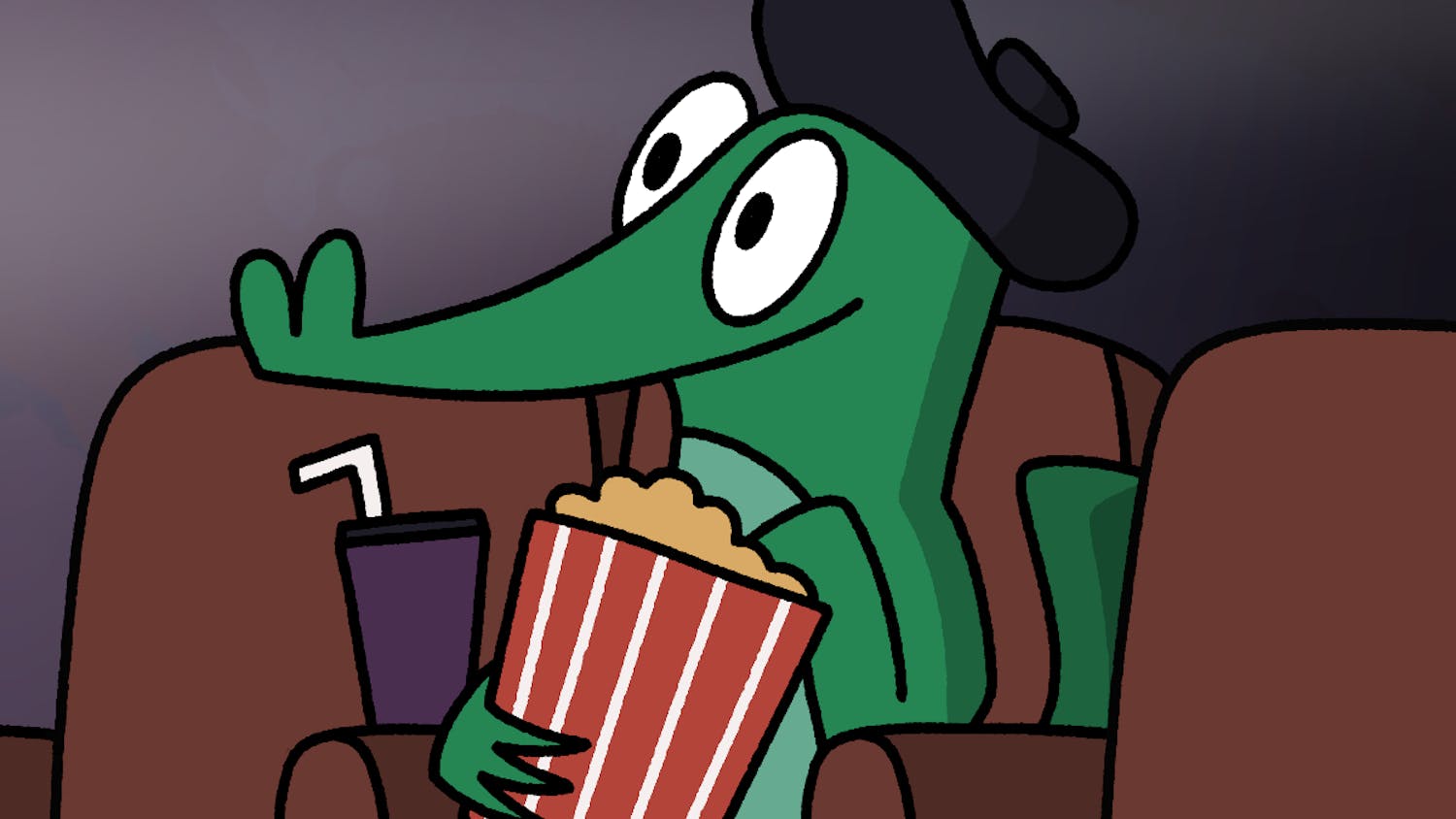Spoilers follow for the film Don’t Worry Darling
If this is what Harry’s House looks like, you can count me out.
Relationship scandals, murky press tours and masses of online gossip had no effect on director Olivia Wilde’s sophomore feature, “Don’t Worry Darling.” With $35 million in box office totals as of Oct. 1, the psychological thriller sits as the exemplar that all press is indeed good press — and casting Harry Styles as one of the lead protagonists can’t hurt either.
The film zeros in on married couple Jack and Alice Chambers, who are played by Styles and Florence Pugh. Outfitted in modest dresses and chic half-up-half-down hairstyles, Alice seems to have a perfect life. They live in a small community as part of the Victory Project. For the Victory project, men go to work creating “progressive materials” while the wives stay home cleaning, cooking, taking ballet lessons, shopping and socializing.
Alas, something feels off about this minute, isolated community located in the middle of the desert. In a society where high-tech planes run amuck and sophisticated architecture sits atop the town’s crowning hill, something about this ‘50s-inspired paradise feels too modern. Like any good dystopian trope, the plot develops as Alice becomes suspicious of her husband’s job and the faults her community is founded on.
In short, the Victory Project is a hyper-masculine mind simulation where husbands store their wives to live an affluent life of classy gatherings, Brenton Wood soundtracks and a lot of sex.
In the real world, Jack and Alice are poor, and their relationship sits on a fault line. While Alice works tirelessly as a surgeon, Jack sits at home watching propaganda and lamenting the lack of intimacy between him and his wife. One night, he forces computerized eyewear onto Alice’s unconsenting body and traps her in the Victory Project.
I hope this information suffices to quench your curiosity — because the actual movie will not. You’d have an easier time finding out if Harry Styles actually spit on Chris Pine at the Venice Film Festival.
As someone who had to know her cast would target and attract the audience who grew up on stories like “The Hunger Games” and “Divergent,” Wilde seriously missed the mark on what a good dystopian piece contains: plot development.
For the 123-minute run time, I must admit that the movie was an enjoyable watch. From inception to insanity, Pugh put on an emotional and chilling performance that made you feel like you could empathize with her absurdity. In fact, every actor in “Don’t Worry Darling” gave an astonishing performance, even Harry Styles.
As an actor whose resume includes “Dunkirk” and that One Direction episode of “iCarly,” I think Styles portrayed Jack in a way that helped audiences buy the storyline. The Victory Project only thrives if the wives don’t know they’re being gaslit into obedience, and Styles’ undeniable charm as an actor leads the audience to trust the community in the same way Alice once did. His proficient commitment to the “good guy” bit was the reason his “bad guy” reveal was so hard-hitting.
Bolstered by other phenomenal performances from actors like Kiki Layne, Chris Pine and Sydney Chandler, I thought I was watching a good movie in the moment.
But once the credits were rolling and the plot holes were inexhaustible, my illusion of entertainment fell apart quicker than the Victory Project itself.
“Don’t Worry Darling” felt like a collection of loose ends the production team got too lazy to tie up.
There were many symbolic references inexplicably brought up in the first half of the movie, but that was excusable on the illusion that they’d make sense by the end. I’m worried the decision to never revisit those points wasn’t done out of tasteful ambiguity, but instead, a complete lack of regard for the movie’s detailing.
For starters, how did the Victory Project even come to be? We learn why Jack joined the project with his wife, but what villain origin story drives a man to create something so heinous? Chris Pine did a wonderful job establishing himself as Frank, the rugged, power-hungry and misogynistic cult leader, and his complete lack of character development is a detriment to the movie’s credibility as a whole. While I love the moment where Gemma Chan unexpectedly kills her husband as much as the next girl, how impactful can it be when you know nothing about the characters?
In the same breath, Kiki Layne’s character Margaret is one who I think needed to play a more pivotal role in the film. As the woman who is the muse for Alice’s madness, her character is removed from the movie in a death scene that happens far too early. Even worse, the doctors from the Victory Project assure Alice (who witnessed Margaret’s death) that she’s recovered from her accident with no hint of closure for the viewers. While it might be true they were gaslighting Alice into getting off their case, a revelation of Margaret’s well-being made clear to the audience would have created the sort of dramatic irony that is both disturbing and beneficial to advancing the storyline.
It’s not as if the storyline doesn’t develop throughout the movie, but rather, not everything makes an impactful, full-circle moment. There are many moments where the producers missed an opportunity to develop an idea that would bring “Don’t Worry Darling” from amateur to award-winning.
One of the most haunting scenes in the movie happens when the audience realizes where Alice’s perpetual humming originates. Her audible jingle is an unwavering sound throughout various timestamps in the movie, and in one specific ending scene, it’s revealed to be the same song Jack sings to her in the real world whenever he leaves the simulation for the day.
But this one praiseworthy moment does nothing to distract from the other plot points left in limbo.
Take the earthquakes and plane crashes for example. One of the very first scenes of Jack and Alice in their home depicts them obstructing breakables from falling on the floor while their house violently shakes. The two are poised and composed, like this is something that happens frequently. As more arbitrary earthquakes happen throughout the film, their importance heightens. Perhaps they’re linked to the plane crash that drives Alice to the border of Victory and the real world, but we will never know, because the idea is completely ditched mid-movie.
Another lost concept the producers underdeveloped includes Alice’s insanity in relation to her real life. We know Jack’s singing manifests as Alice’s humming in the simulation, but what in the real world causes her to crack eggs with no yolk, have the walls close in on her and constrict her airway with Saran wrap? They personify a lapse in mental stability at first, but miss the mark in being indispensable to the plot once the movie ends.
Perhaps the worst example of this is a plot point brought up nearly 10 minutes before the credits roll. Bunny, Alice’s friend in the Victory Project portrayed by Wilde, is the only woman who has voluntarily decided to live in this simulation. In a panic, she reveals that she lives in Victory and lies to Alice because it’s the one place where she still has her kids. While we can assume Bunny lost her kids in the real world, the production team passed on the opportunity to develop a villain you could commend — someone who offers a morally gray balance to a group of men who are clear-cut wrongdoers.
This leads to my final critique of 2022’s most anticipated film: Harry Style’s popularity and conventional attractiveness aren’t a reason to be a Jack Chambers apologist. In intentionally casting music’s biggest name, Wilde should have been more conscious about the role she allowed him to play. With Styles’ target demographic of young, impressionable girls, I’m not certain casting him as a manipulative and controlling husband was the best move in trying to produce a film that made commentary on feminism and women’s roles in society.
Perhaps it’s my inability to distinguish actor Styles from real Styles, but if the need for box office success upstages the desire to comment on societal plights — how successful can the movie actually be?
Rating: ⅗ stars (but one star solely dedicated to Pugh’s breathtaking depiction of losing your mind).
Contact Averi at akremposky@alligator.org. Follow her on Twitter @averijkremposky.

Averi Kremposky is a senior journalism major at the University of Florida. When she’s not covering music, art and culture beats for The Avenue, you can find her going to a concert, finishing another book in one sitting or submitting to the latest Taylor Swift album theory.





